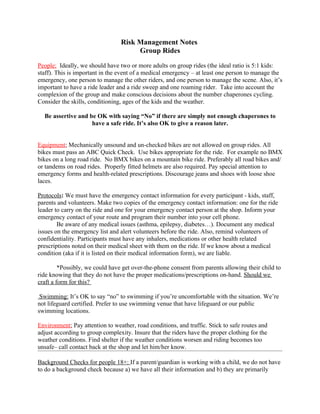
Risk management notes from staff meeting for group rides
- 1. Risk Management Notes Group Rides People: Ideally, we should have two or more adults on group rides (the ideal ratio is 5:1 kids: staff). This is important in the event of a medical emergency – at least one person to manage the emergency, one person to manage the other riders, and one person to manage the scene. Also, it’s important to have a ride leader and a ride sweep and one roaming rider. Take into account the complexion of the group and make conscious decisions about the number chaperones cycling. Consider the skills, conditioning, ages of the kids and the weather. Be assertive and be OK with saying “No” if there are simply not enough chaperones to have a safe ride. It’s also OK to give a reason later. Equipment: Mechanically unsound and un-checked bikes are not allowed on group rides. All bikes must pass an ABC Quick Check. Use bikes appropriate for the ride. For example no BMX bikes on a long road ride. No BMX bikes on a mountain bike ride. Preferably all road bikes and/ or tandems on road rides. Properly fitted helmets are also required. Pay special attention to emergency forms and health-related prescriptions. Discourage jeans and shoes with loose shoe laces. Protocols: We must have the emergency contact information for every participant - kids, staff, parents and volunteers. Make two copies of the emergency contact information: one for the ride leader to carry on the ride and one for your emergency contact person at the shop. Inform your emergency contact of your route and program their number into your cell phone. Be aware of any medical issues (asthma, epilepsy, diabetes…). Document any medical issues on the emergency list and alert volunteers before the ride. Also, remind volunteers of confidentiality. Participants must have any inhalers, medications or other health related prescriptions noted on their medical sheet with them on the ride. If we know about a medical condition (aka if it is listed on their medical information form), we are liable. *Possibly, we could have get over-the-phone consent from parents allowing their child to ride knowing that they do not have the proper medications/prescriptions on-hand. Should we craft a form for this? Swimming: It’s OK to say “no” to swimming if you’re uncomfortable with the situation. We’re not lifeguard certified. Prefer to use swimming venue that have lifeguard or our public swimming locations. Environment: Pay attention to weather, road conditions, and traffic. Stick to safe routes and adjust according to group complexity. Insure that the riders have the proper clothing for the weather conditions. Find shelter if the weather conditions worsen and riding becomes too unsafe– call contact back at the shop and let him/her know. Background Checks for people 18+: If a parent/guardian is working with a child, we do not have to do a background check because a) we have all their information and b) they are primarily
- 2. working with their own child. If there is someone 18 + working with frequently working with a friend, ask if he/she considers him/herself a volunteer and/or would like to volunteer here in the future. If the answer is “no,” that could be a red flag for follow-up. Bike-to-School: If a child show up in a bike is not physically sound, he/she is not OK to ride with us. Call the parents and let them know. Revised 5/14/10
